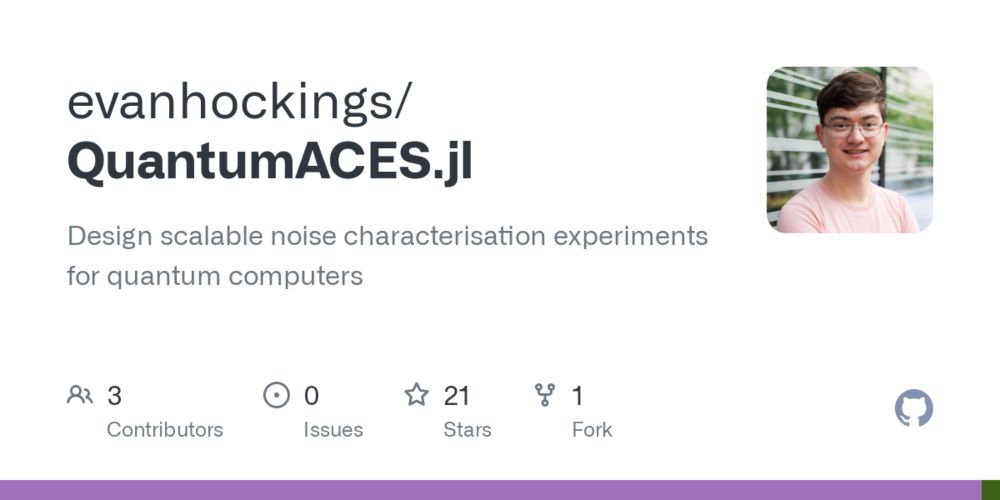Evan Hockings
@evanhockings.bsky.social
Member of Technical Staff @ Iceberg Quantum
evanhockings.github.io
evanhockings.github.io
Congratulations!!
April 19, 2025 at 2:29 AM
Congratulations!!
For more, check out my new paper with @acdoherty.bsky.social and Robin Harper! And look forward to some experimental results soon :)
arxiv.org/abs/2502.21044
arxiv.org/abs/2502.21044

Improving error suppression with noise-aware decoding
The performance of quantum error correction can be improved with noise-aware decoders, which are calibrated to the likelihood of physical error configurations in a device. Averaged circuit eigenvalue sampling (ACES) is a Pauli noise characterisation technique that can calibrate decoders at the scales required for fault-tolerant quantum computation. We demonstrate that ACES is practically capable of calibrating a fast correlated matching decoder, enabling noise-aware decoding, in circuit-level numerical simulations of the surface code. We find that noise-aware decoding increases the error suppression factor of the code, yielding reductions in the logical error rate that increase exponentially with the code distance. Our results indicate that noise characterisation experiments performed and processed in seconds will suffice to calibrate decoders for fault-tolerant superconducting quantum computers. This establishes the practicality and utility of noise-aware decoding for quantum error correction at scale.
arxiv.org
March 3, 2025 at 7:32 AM
For more, check out my new paper with @acdoherty.bsky.social and Robin Harper! And look forward to some experimental results soon :)
arxiv.org/abs/2502.21044
arxiv.org/abs/2502.21044
Stim and PyMatching make this super easy. Characterise a circuit-level Pauli noise model with ACES, throw the noise estimates into your Stim circuit, and then it all just works—thanks @craiggidney.bsky.social and @oscarhiggott.bsky.social!
Code for this now in QuantumACES
github.com/evanhockings...
Code for this now in QuantumACES
github.com/evanhockings...

GitHub - evanhockings/QuantumACES.jl: Design scalable noise characterisation experiments for quantum computers
Design scalable noise characterisation experiments for quantum computers - evanhockings/QuantumACES.jl
github.com
March 3, 2025 at 7:32 AM
Stim and PyMatching make this super easy. Characterise a circuit-level Pauli noise model with ACES, throw the noise estimates into your Stim circuit, and then it all just works—thanks @craiggidney.bsky.social and @oscarhiggott.bsky.social!
Code for this now in QuantumACES
github.com/evanhockings...
Code for this now in QuantumACES
github.com/evanhockings...
Yes! Gate times in superconducting architectures indicate that ACES noise characterisation experiments performed and processed in just seconds should suffice. At tens of seconds, ACES noise estimates are nearly indistinguishable from the true noise model for decoding.
March 3, 2025 at 7:32 AM
Yes! Gate times in superconducting architectures indicate that ACES noise characterisation experiments performed and processed in just seconds should suffice. At tens of seconds, ACES noise estimates are nearly indistinguishable from the true noise model for decoding.
This means the reduction in logical error rates from noise-aware decoding increases exponentially with the code distance. While gains are limited for small codes, they're substantial for large ones.
But is noise-aware decoding practical at the scales where it's most helpful?
But is noise-aware decoding practical at the scales where it's most helpful?
March 3, 2025 at 7:32 AM
This means the reduction in logical error rates from noise-aware decoding increases exponentially with the code distance. While gains are limited for small codes, they're substantial for large ones.
But is noise-aware decoding practical at the scales where it's most helpful?
But is noise-aware decoding practical at the scales where it's most helpful?
Yeah, I have to imagine it’s a tokenisation problem (similar to the ARC-AGI benchmark) and I sort of wonder if the labs find it convenient for these issues to stick around right now (reduced alarm, regulation, etc)…or maybe LLMs just aren’t that smart?
February 9, 2025 at 3:11 AM
Yeah, I have to imagine it’s a tokenisation problem (similar to the ARC-AGI benchmark) and I sort of wonder if the labs find it convenient for these issues to stick around right now (reduced alarm, regulation, etc)…or maybe LLMs just aren’t that smart?

